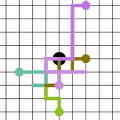The reflection-maximal coupling of the random walk Metropolis (RWM) algorithm was recently proposed for use within unbiased MCMC. Numerically, when the target is spherical this coupling has been shown to perform well even in high dimensions. We derive high-dimensional ODE limits for Gaussian targets, which confirm this behaviour in the spherical case. However, we then extend our theory to the elliptical case and find that as the dimension increases the reflection coupling performs increasingly poorly relative to the mixing of the underlying RWM chains. To overcome this obstacle, we introduce gradient common random number (GCRN) couplings, which leverage gradient information. We show that the behaviour of GCRN couplings does not break down with the ellipticity or dimension. Moreover, we show that GCRN couplings are asymptotically optimal for contraction, in a sense which we make precise, and scale in proportion to the mixing of the underling RWM chains. Numerically, we apply GCRN couplings for convergence and bias quantification, and demonstrate that our theoretical findings extend beyond the Gaussian case.
翻译:最近有人提议在不带偏见的MCMC内使用随机步行大都会算法的反射最大组合。 从数字上看,当目标为球形时,这种组合显示即使在高维方面效果良好。我们为高斯目标得出高维的ODE限值,这在球状情况下证实了这种行为。然而,我们然后将我们的理论扩大到椭圆体,发现随着这个维度使反射组合与深层RWM链的混合发生越来越差。为了克服这一障碍,我们采用了梯度普通随机数(GCRN)的组合,利用梯度信息。我们表明,GCRN的组合行为并不与椭圆或维度发生断裂。此外,我们表明,GCRN的组合对于收缩来说,在某种意义上说来算得不够完美,而且与下层RWM链的混合成比例也越来越小。从数量上看,我们采用GCRN的组合组合来利用梯度信息。我们表明,我们的理论结论结论结果超越了Gaus案的范围。



